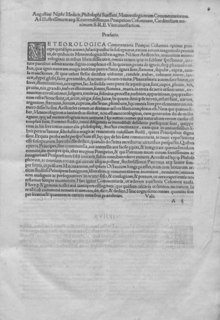Agostino Nifo
Agostino Nifo (* approx. 1473 in Sessa Aurunca near Caserta ; † after 1538; also Augustinus Niphus ) was an Italian philologist and philosopher of Aristotelianism . After studying medicine and philosophy in Padua with Nicoletto Vernia , a well-known Averroist , among others , he taught at the University of Padua as well as in Naples , Rome and Pisa . His reputation was so great that he was commissioned by Pope Leo X to defend the doctrine of the immortality of the soul against the attacks of Pomponazzi . As a reward, he received the title of count and the right to call himself Medici .
Nifo's thinking can be divided into two phases. His early writings mainly followed Averroes , in 1495 he published an annotated edition of Averroes' works. Later he switched to Catholic Orthodoxy by approaching a more Thomistic understanding of Aristotle and Florentine Neoplatonism . Here there are also points of contact with Ficino and Pico . It is controversial to what extent this second phase arose from a real scientific repositioning and not rather from political opportunism, especially towards Leo X.
Nifo's thinking is judged to be not very original, but his profound philosophical education is appreciated, which shows knowledge especially of the works of Thomas Aquinas , Siger von Brabant , Themistios and Alexander von Aphrodisias .
Nifo is best known for his work De immortalitate animae libellus adversus P. Pomponacium from 1518. In the often polemical and personally insulting work, he contradicts Pomponazzi's doctrine that the human soul is inseparable from the material body of the individual and consequently the death of the Body necessarily draw that of the soul after it. Rather, as part of the absolute intellect, according to Nifo, the soul is indestructible, and death only leads to unity with the absolute intellect.
The physical writings of Niphus attempt to reconcile the impetus theory with the averroistic worldview. In ethics he is close to hedonism . Little known is his book De regnandi peritia (Naples 1523), which “ plagued the ' Principe ', albeit with certain omissions and additions.” With this treatise, Niccolò Machiavelli's “moral ostracism” begins .
Nifo's commentaries on Aristotle found widespread circulation and numerous new editions; the most important edition appeared in fourteen volumes in Paris in 1654.
Works
Averroistic phase
- De intellectu et daemonibus (Padua 1492; actually 1503, but predated by Nifo to portray his averroism as a youthful aberration)
- In librum destructio destructionum commentarii . Venice 1497
- Expositiones in Aristotelis libros Metaphysices 1518
Thomistic-Neoplatonic phase
- De primi Motoris Infinitate Liber . Venice 1505.
- Tractatus de immortalitate animi contra Petrum Pomponatium. Venice 1525.
- De regnandi peritia . Naples 1523.
- De pulchro et amore . Rome 1531.
- Opuscula moralia et politica. Paris 1645.
Aristotle's comments
- Super tres libros "De Anima" . Venice 1503.
- Collectanea ac commentaria in libros Aristotelis "De Anima" . Venice 1522.
- Expositiones in omnes libros de Historia animalim, de partibus animalium et earum causis ac de Generatione animalium . Venice 1546.
- Physicorum auscultationum Aristotelis libri octo . 1549
- In libros de sophisticis elenchis Aristotelis . Venice 1551.
- Commentarium in tres libros Aristotelis De anima . 1559
- Dilucidarium metaphysicarum disputationum in Aristotelis Deum et quatuor libros metaphysicarum . 1559
literature
- Margherita Palumbo: Nifo, Agostino. In: Raffaele Romanelli (ed.): Dizionario Biografico degli Italiani (DBI). Volume 78: Natta – Nurra. Istituto della Enciclopedia Italiana, Rome 2013.
- Edward P. Mahoney: Two Aristotelians of the Italian Renaissance: Nicoletto Vernia and Agostino Nifo , Aldershot u. a. 2000.
- A. Pattin: Un grand commentateur d'Aristote: Agostino Nifo , in: B. Mojsisch u. O. Pluta (Ed.): Historia philosophiae Medii Aevi - Studies on the history of the philosophy of the Middle Ages , Amsterdam / Philadelphia 1991, Vol. 2, pp. 787-803.
Web links
- Literature by and about Agostino Nifo in the catalog of the German National Library
- Digitized at Google Books
Individual evidence
- ↑ Palumbo in DBI gives 1469/70 as an approximate year of birth.
- ↑ a b c Lexicon of the Renaissance. Edited by Günter Gurst, Siegfried Hoyer, Ernst Ullmann and Christa Zimmermann. Leipzig: Bibliographisches Institut, 1989. sv 'Niphus', p. 510
- ↑ M. Schiavone: Article “Nifo, Agostino”. In: Enciclopedia filosofica. 2nda Edizione interamenta rielaborata. Vol. IV. Ed. Sansoni 1970, pp. 1032f
- ↑ a b c Enciclopedia filosifaca p. 1032
- ^ August Buck : Machiavelli , Darmstadt, 1985, ISBN 3-534-01294-1 , p. 131
| personal data | |
|---|---|
| SURNAME | Nifo, Agostino |
| ALTERNATIVE NAMES | Niphus, Augustine |
| BRIEF DESCRIPTION | Italian philosopher and philologist |
| DATE OF BIRTH | around 1473 |
| PLACE OF BIRTH | Sessa Aurunca near Naples |
| DATE OF DEATH | after 1538 |
